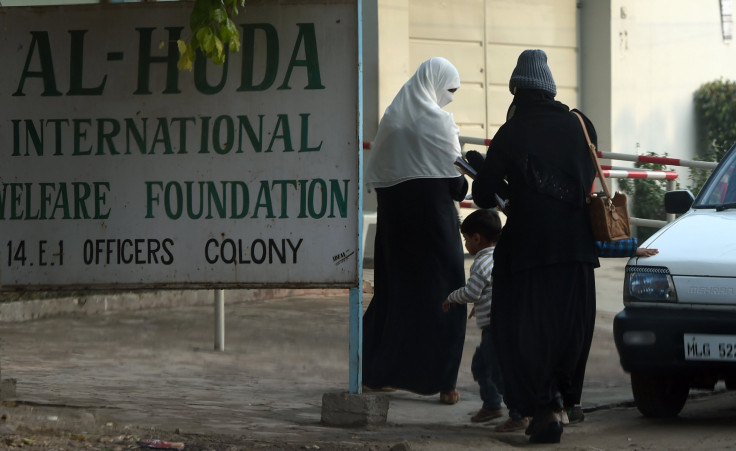What Does Tashfeen Malik's Attendance At A Pakistani Religious School Tell Us About Her Path To Radicalization?

As authorities piece together the backgrounds of Syed Rizwan Farook and Tafsheen Malik in an attempt to discover how they became radicalized, one detail stands out: Malik, the mother of their 6-month-old, attended a theological school in Pakistan that espouses a deeply conservative view of Islam.
The married shooters, who took the lives of 14 people in a rampage in San Bernadino, California, earlier this month, took several trips to the Middle East and South Asia, but Malik's attendance at the women's theological school in Multan, Pakistan, has triggered scrutiny. The school, al-Huda International Welfare Foundation, caters to affluent, well-educated women in Pakistan and has become more popular in recent years as formerly secular women embrace more conservative traditions.
The organization combines a conservative brand of Islam with a modern approach to education, with advanced communications, online lectures and modern facilities, particularly by Pakistan's standards. Al-Huda Foundation schools, founded in the early 1990s by a woman named Farhat Hashmi, focus on the study of the Quran and particularly the place of women in conservative Islam.
Many schools operate under the name al-Huda -- which means "guidance" -- in the U.S. and Canada but aren't affiliated with Hashmi's foundation.
One location that is affiliated with the group, al-Huda Institute Canada near Toronto, came under fire days ago when three of its students -- one girl and three women -- were found to have traveled to Syria to join the Islamic State group.
Malik took Quran classes for about a year at the Multan branch of al-Huda, but never received a degree. After the shootings, the school released a statement on Malik's attendance, distancing itself from the violent actions of one of its former students.
"[Al-Huda] does not have links to any extremist regime and stands to promote [a] peaceful message of Islam and denounces extremism, violence and terrorism of all kinds," the statement read. "Tashfeen Malik had studied at al-Huda International’s Multan branch for a brief period between 2013 and 2014. She left without completing the diploma course. No organisation can be held responsible for personal acts of any of its students."
Literalist Islam
Experts do say the schools focus on teaching an interpretation of Islam that is rooted in Salafism, a conservative Sunni movement that promotes, in some cases, a literalist understanding of Islam. It is also the ideology embraced by many extremist groups like the Islamic State, also known as ISIS. But experts say it's difficult to draw a direct line between Malik's educational background and her extremist views.
"It is simplistic to say she went to this university and to this madrassa and found this man and shot 14 Americans," said Raza Rumi, who teaches about South Asia at Ithaca College and serves as a senior fellow at the Jinnah Institute, a think tank that focuses on extremism in Pakistan. "There are definitely more factors here."
"Hashmi's teachings are ultra-conservative," said Ebrahim Moosa, professor of Islamic studies at the University of Notre Dame. "She invites people to a very austere form of Islam. But she is not a preacher for jihad."
Rumi added that in "no way do they preach or teach violence."
"There are thousands of other women who have attended al-Huda … so Tashfeen is an odd example out of the whole sample size. One has to look at the data. You don't have al-Huda women going out and becoming violent at all," Rumi said.
"I'm skeptical of making a connection between this organization and [Malik's] path to violence," said Arif Rafiq, an analyst at the Middle East Institute in Washington. He said Malik's attendance was probably responsible for her transition to Salafi beliefs, which may have made her more susceptible to extremist ideologies like that of ISIS. Still, he cautioned there is no one common background thread between those who have joined ISIS in recent years.
Deeply Conservative, Insular
The conservative environment at the school may have created a more fertile ground for extremist views to filter through.
"Al-Huda is deeply conservative, and insular. But sadly this insularity does train your mind to get disengaged from the outside, and you see that in a lot of people who resort to violence," Rumi said.
Moosa said it "would not be surprising if graduates from al-Huda schools show sympathy for ISIS or are attracted by ISIS since the extreme Salafist/Wahhabi teachings they share encourage such superficial and dangerous thinking. It does not mean that al-Huda teaches radicalism."
Some have also raised questions about the travels of Malik and Farook to Saudi Arabia. But most experts dismissed outright that it would have influenced their radicalization.
"Many Muslims make repeated umrah and hajj trips to Mecca. This pattern of movement of travel is by no means something that should be perceived as suspicious on its own because there are literally millions who do the same thing," Rafiq said.
© Copyright IBTimes 2025. All rights reserved.





















